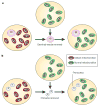Mitochondrial DNA mutations in human disease
- PMID: 15861210
- PMCID: PMC1762815
- DOI: 10.1038/nrg1606
Mitochondrial DNA mutations in human disease
Abstract
The human mitochondrial genome is extremely small compared with the nuclear genome, and mitochondrial genetics presents unique clinical and experimental challenges. Despite the diminutive size of the mitochondrial genome, mitochondrial DNA (mtDNA) mutations are an important cause of inherited disease. Recent years have witnessed considerable progress in understanding basic mitochondrial genetics and the relationship between inherited mutations and disease phenotypes, and in identifying acquired mtDNA mutations in both ageing and cancer. However, many challenges remain, including the prevention and treatment of these diseases. This review explores the advances that have been made and the areas in which future progress is likely.
Conflict of interest statement
Competing interests statement
The authors declare no competing financial interests.
Figures




References
-
- Zeviani M, Di Donato S. Mitochondrial disorders. Brain. 2004;127:2153–2172. - PubMed
-
- Ivanov PL, et al. Mitochondrial DNA sequence heteroplasmy in the Grand Duke of Russia Georgij Romanov establishes the authenticity of the remains of Tsar Nicholas II. Nature Genet. 1996;12:417–420. - PubMed
-
- Anderson S, et al. Sequence and organization of the human mitochondrial genome. Nature. 1981;290:457–465. This paper describes the sequence and organization of human mtDNA — the first complete mitochondrial genome to be sequenced. - PubMed
-
- Bibb MJ, Van Etten RA, Wright CT, Walberg MW, Clayton DA. Sequence and gene organization of mouse mitochondrial DNA. Cell. 1981;26:167–180. - PubMed
-
- Anderson S, et al. Complete sequence of bovine mitochondrial DNA. Conserved features of the mammalian mitochondrial genome. J Mol Biol. 1982;156:683–717. - PubMed
Publication types
MeSH terms
Substances
Grants and funding
LinkOut - more resources
Full Text Sources
Other Literature Sources
Medical

